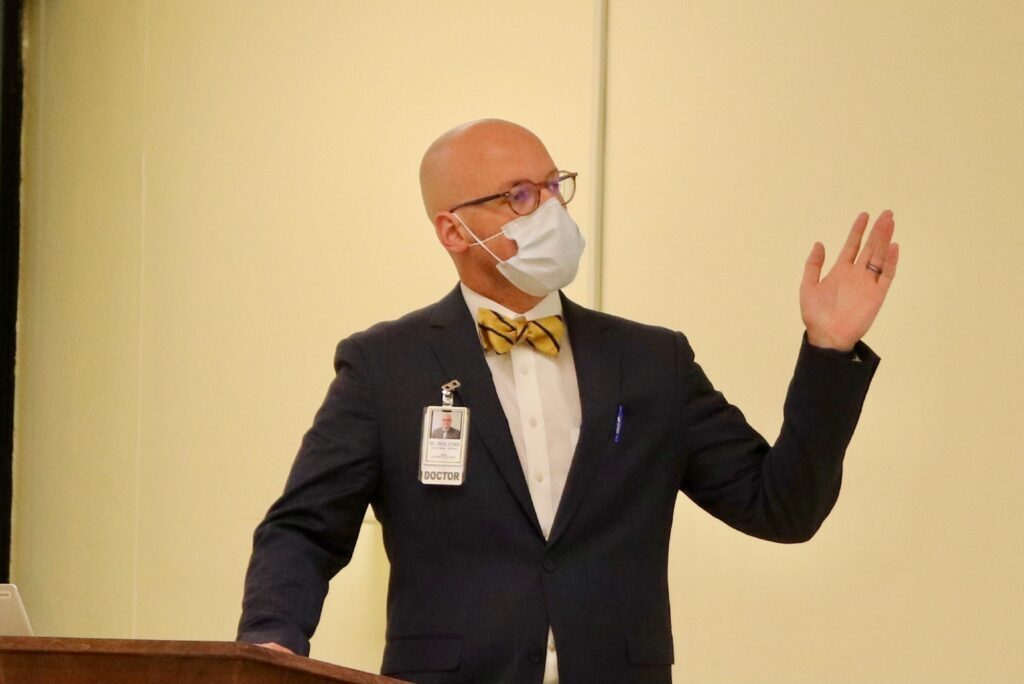Mason Galemore
Contributing Writer
mgalemore@murraystate.edu
A previous edition of this article posted on Sept. 22 said, “According to a study conducted by the U.S. military, only 23 out of 2 million vaccinated males experienced side effects.” The correct information should read, “According to a study conducted by the U.S. military, only 23 out of 2 million vaccinated males experienced heart inflammation.”
Nicholas O’Dell, the medical director at Murray-Calloway County Hospital, delivered a presentation addressing COVID-19 vaccine misinformation and the efficacy of the vaccine to Murray State nursing students on Sept. 3.
The presentation’s purpose was to teach the students to study the vaccine with objectivity. O’Dell said there is little room for argument when studying the facts of the vaccine.
“The presentation was to give an in-depth educational review of the mRNA vaccine technology,” O’Dell said. “This included its historical uses, development for use in the fight against COVID-19 and how the mechanism of action was similar and different from other vaccines that have been used throughout history.”
According to cdc.gov, mRNA instructs cells to produce certain proteins. Once the vaccine is injected into the arm muscles, the cells produce a protein piece and discard the instructions. The immune system recognizes this protein as foreign and begins making antibodies to form an immune response.
O’Dell said people are mainly concerned with three aspects of the vaccine. One of those points is that the technology used to develop the vaccine is too new. O’Dell’s presentation responded to that belief, saying the mRNA technology has been around since the 1960s.
The second aspect covered was side effects. According to a study conducted by the U.S. military, only 23 out of 2 million vaccinated males experienced side effects.
The last aspect addressed was the short time it took for the vaccine to be distributed. The Centers for Disease Control said the vaccine had to be tested for safety and efficacy.
To address this concern, O’Dell said many companies such as Pfizer-BioNTech decided to make the vaccine and test them at the same time. If the vaccine failed the tests, the companies threw away the batches they made and took a financial loss. If they passed, the companies prepared the batches for distribution which explained why they were distributed rapidly.
O’Dell was able to have a more in-depth conversation about the vaccine because of the students’ existing knowledge of medicine. He said it is easy to be fooled if someone does not know the small details about the vaccine.
Junior nursing major Taylor Gillett said she believes everyone should get vaccinated. However, she does not want to force anyone to take it.
“I thought the presentation gave very grounding proof that the vaccine isn’t dangerous like everyone thinks it is,” Gillett said. “While the need to educate people about the vaccine is important, I would rather not push something on them that they do not want than risk losing their trust in the healthcare system.”
Sophomore nursing major Cade Alberson said he received the Moderna vaccination when it became available through Murray State.
“To those who are hesitant to take the vaccine, I would encourage them to weigh the risks of getting COVID against the potential side effects of the vaccine,” Alberson said.
Alberson said the most memorable part of the presentation was when O’Dell addressed rumors about the vaccine. One rumor that interested Alberson was that the vaccine caused infertility in women. He said it opened his eyes as to what kind of misinformation was being spread.
“I’d like to see more research become easily accessible to the public,” Alberson said. “As healthcare professionals, we are taught where to find reputable information regarding new vaccines and emerging practices. If we achieve this, I believe we will see a reduction in overall illness and increase in patient satisfaction levels in the healthcare setting.”
O’Dell said treating COVID-19 patients and informing the public on the virus has been the largest responsibility in his career. He said even though the pandemic has been filled with struggles, he still has optimism.
“It has become harder to take care of patients and help them live healthier lives, which is what all of us got into this business to do,” O’Dell said. “But that won’t stop those of us on the front lines of this pandemic who continue to do our best for our patients day in and day out despite the naysayers and detractors.”
Students can schedule a COVID-19 vaccination at Health Services in Wells Hall.
More information about the vaccine can be found on the CDC’s website at cdc.gov/coronavirus.




























































































